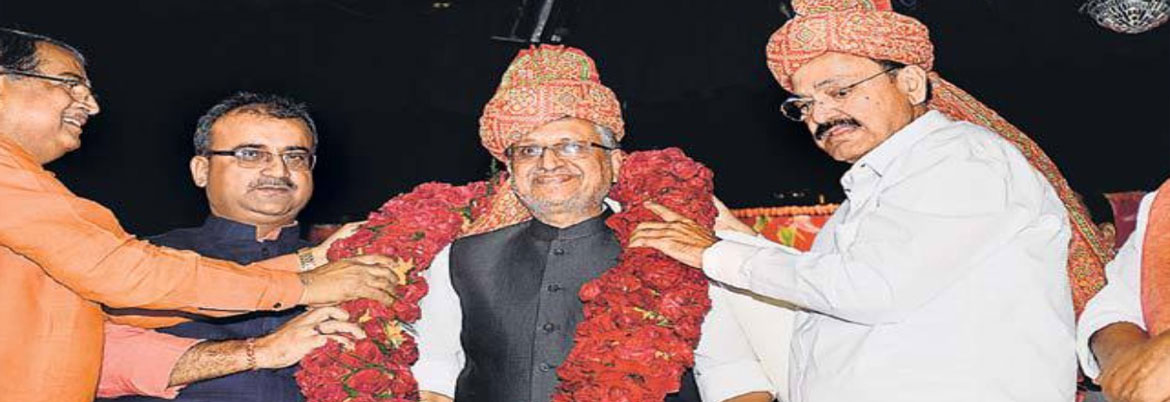Bihar - More than just another state election
- In Politics
- 12:56 AM, Jun 26, 2015
- Nitendra Raghuvanshi
Bihar is the most important eastern state of India in more than one sense. It is the third largest by population and its population is the fastest-growing of any state. Once known as the center for Power, learning and culture with universities such as Nalanda; Bihar has lagged far behind other Indian states in terms of its social and economic development since late 1970’s. In 1974, Bihar led the movement against Congress under the leadership of Jai Prakash Narayan which finally led to the downfall of Congress and the formation of the first non-congress government in 1977. The movement not only led to the downfall of Congress but also gave rise to most of the current prominent leaders from Bihar including Lalu Prasad Yadav, Ram Vilas Paswan, Nitish Kumar, Ravi Shankar Prasad to name just a few. Unfortunately, the Janta Party govt could not last for long with Congress coming back to power in 2 years.
The 1990’s became a new turning point in Bihar politics with Lalu Prasad Yadav becoming the Chief Minister after winning the race for the legislative party leadership by a slender margin against Ram Sundar Das, a former chief minister from the Janata Party and close to eminent Janata Party leaders Chandrashekhar and S N Sinha. Lalu’s fifteen year rule (including Rabri Devi’s govt) was often criticized for its weak governance and corruption.
By 2004 disaffection against Lalu’s rule often described as “Jungle Raaj” reached its peak. Bihar faced enormous issues because of "persistent poverty, complex social stratification, unsatisfactory infrastructure, weak governance and rampant corruption. Environment of gloom and doom made Lalu’s government very unpopular leading to its downfall in 2005 with NDA coming to power under Nitish Kumar.
During NDA rule, Bihar started its recovery and slowly moved from “Jungle Raaj” to rule of law. With state on its way towards development, NDA came back to power again in 2010. But with bitter split between BJP and JDU that too on the question of Narendra Modi’s leadership of NDA the sixteen year old alliance ended into a very acrimonious atmosphere.
After the split, Nitish suffered a crushing defeat in Loksabha elections in May 2014. May 2014 also embarked on a period of BJP vs Rest in Indian politics. This was evident with BJP and its allies winning 4 out of 5 state elections. But a crushing defeat in Delhi, Congress and other opposition parties trying to revive themselves over the ever so emotional land bill and lack of majority in the upper house has raised very formidable opposition to political agenda of BJP and Modi government.
With no option left and existential crisis looming large former Janta pariwar associates Nitish and Lalu have joined hands for the upcoming Bihar assemble elections. New political equations and Prime minter Narendra Modi government completing its one year, Bihar election promises to be a nail biter.
Even after announcement of formal alliance between Nitish and Lalu this is only the first step. Questions ranging from seat sharing to motivating hostile cadre on the ground to work together will be a huge challenge for the new alliance. Sensing the election to be a two way contest between Janta alliance and NDA, BJP has also broad based its coalition by adding Jitan Ram Manjhi former chief Minister to its alliance. With crucial forces of Indian politics in play, Upcoming Bihar election has the potential to make or break political careers of Lalu and Nitish on one hand to posing serious perception problem to NDA government in the centre on the other.
Good performance in Bihar will present BJP and Modi government a great opportunity to derail all plans of opposition revival and will severely dent prospects of Rahul Gandhi's Left of Centre populist agenda. Victory in a backward agrarian state will also demolish all notions and perceptions of Modi govt. being pro corporate and anti-farmer. On the contrary it will strengthen govt’s image of being pro poor and will re-establish Modi's supremacy in Indian politics. It will also shatter all plans of realignment of anti Modi forces and Janta parivar’s revival.
Bihar election is also very significant because of personal chemistry and political history between Chief Minister Nitish Kumar and Prime Minister Narendra Modi. Political Commentators often have describe Nitish as supreme leader of the state even after his loss in 2014 LokSabha elections. But a loss in assembly elections can spell doom for political importance and significance of Nitish Kumar. Bihar is also significant for BJP in its attempt to gain majority in RajyaSabha.
On the other hand loss in Bihar may not have any direct impact on the Centre but it will severely damage its reform agenda. It will also raise serious questions about continuity of Modi magic and its ability to make BJP win elections. Loss will also revive opposition, give a much needed push to Rahul Gandhi and congress party and will force Govt. to move towards more populist agenda.
Mamata Banerjee in Bengal, Mulayam Singh in UP and other third front leaders will also gain a lot of confidence with BJP's defeat in Bihar. Remember Bengal and UP will also face electorates in 2016 and 2017 respectively. Within the BJP also loss will revive aspirations of marginalized sections and could see Sangh Parivar playing more active role.
Bihar is the most important and politically significant test for the Narendra Modi Government at the center. The results in Bihar will play crucial role in deciding the direction of future Indian politics and the economic agenda of the Central Govt.
By- Nitendra Raghuvanshi







Comments